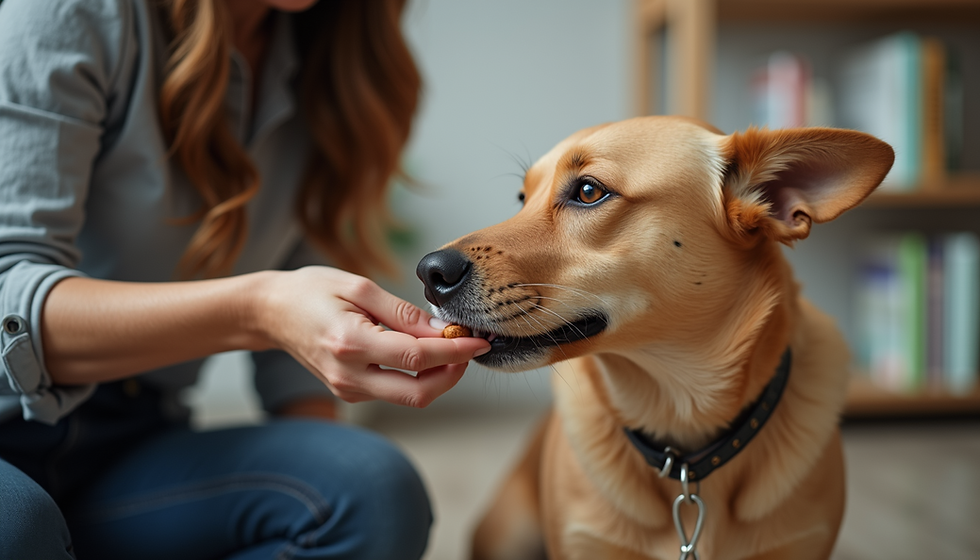The Importance of Early Puppy Socialization: A Guide for New Pet Parents
- Miri Levy
- Sep 25, 2025
- 3 min read
Updated: Dec 31, 2025
Bringing home a new puppy is one of life's sweetest moments—full of excitement, puppy breath, and adorable antics. There's nothing quite like watching your pup experience the world for the first time! Along with all the joy, one crucial element significantly shapes your dog's personality and behavior: early puppy socialization.
Understanding Puppy Socialization
Puppies experience a critical socialization period from around 3 to 16 weeks of age. During this time, they're naturally curious, fearless, and eager to explore. Their young brains absorb new experiences easily, making this the ideal time to introduce them gently to various sights, sounds, people, and places they'll encounter throughout life.
After about 16 weeks, puppies typically become more cautious and less receptive to unfamiliar situations. Although you can introduce new experiences later, it usually requires more patience and effort. Starting socialization early ensures your puppy has the best chance of developing into a confident, well-adjusted adult dog.
Key Areas for Effective Socialization
Effective socialization involves exposing your puppy to a wide range of positive experiences. Here are essential areas to cover:
People: Introduce your puppy to different ages, appearances, clothing, and ways of moving. This includes children playing, elderly people, or individuals using mobility aids.
Animals: Expose your puppy to gentle adult dogs, puppies, cats, and other animals they might encounter.
Sounds: Familiarize them with household noises like vacuum cleaners and doorbells, as well as traffic sounds, fireworks, and thunderstorms. Recordings can help with this.
Surfaces: Let your puppy explore varied textures like carpets, grass, gravel, hardwood floors, metal grates, and uneven surfaces.
Objects: Introduce everyday items such as bicycles, strollers, umbrellas, balloons, garbage bins, or moving bags.
Handling: Get your puppy used to gentle touching and handling of their paws, ears, tail, mouth, grooming, and gentle restraint.
Environments: Expose them to veterinary clinics, car rides, pet-friendly stores, outdoor cafes, parks, and busy sidewalks.
Your goal isn't to overwhelm your puppy but rather to introduce these experiences gradually, positively, and safely, building confidence over time.
Safety First: Socialization Tips
Since puppies aren't fully vaccinated during this crucial window, balancing exposure with safety is vital. You don't need to wait until all vaccinations are complete; instead, follow these safe socialization tips:
Select safe locations: Avoid crowded dog parks or unknown dogs. Opt for visits to trusted homes, puppy classes with vaccinated puppies, or quieter outdoor areas.
Keep it positive: Use treats, praise, and toys to create positive associations. Always let your puppy explore at their pace.
Short and enjoyable sessions: Brief sessions (5-10 minutes) are perfect for young puppies. This keeps their attention and enthusiasm high.
Observe body language: Encourage curiosity and excitement, but slow down and provide space if your puppy seems fearful or overwhelmed.
Socialization: An Ongoing Commitment
Though early socialization is critical, it's beneficial to continue positive experiences beyond 16 weeks. Regular positive exposure helps build your dog's confidence, adaptability, and overall well-being throughout their life.
The Long-Term Benefits of Socialization
Socializing your puppy isn't just about ticking boxes—it's about preparing your puppy for a happy, confident life in our world. The effort you invest now will pay off with a dog who's not only relaxed and comfortable but also ready to confidently enjoy life's adventures by your side.
Final Thoughts on Puppy Socialization
So grab some treats, watch for wagging tails, and explore the world together—one positive experience at a time! Remember, the journey of socialization is ongoing. Each new experience is a chance for your puppy to grow and thrive.
Nicole Wiebusch CPDT-KA is a certified professional dog trainer with over 20 years of experience helping dogs and their people build strong, positive relationships through training. Whether working with pet dogs on essential manners or coaching competitive teams in dog sports, Nicole’s training philosophy is centered around clear communication, positive reinforcement, and making training fun and effective for both ends of the leash.




Comments